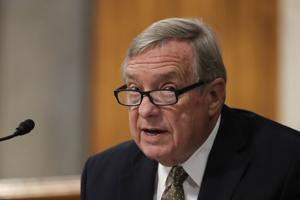(The Center Square) – With the Democrat-sponsored election law changes failing to advance in the U.S. Senate, Illinois’ congressional delegation may be closing in on where the two sides can agree: Redistricting reform.
But, such reform may be too late for Illinois.
On Tuesday in the U.S. Senate, lawmakers failed to advance House Resolution 1, which narrowly passed along party lines in the U.S. House. That resolution included a slew of election changes for states to follow.
Before the measure failed to advance, U.S. Sen. Dick Durbin, D-Springfield, criticized opponents’ “state’s rights” arguments.
“Is a democracy not at its strongest point when more people are participating, and yet Republican legislators write bill after bill to limit those who may be able to vote in the future,” Durbin said.
Like them or not, the recent state-enacted election reforms in Illinois is how changes are made, said U.S. Rep. Rodney Davis, R-Taylorville.
“While I may not agree with every policy that Gov. [J.B.] Pritzker and the Illinois General Assembly pushed and then he signed into law, that’s the process we should use,” Davis told WMAY. “That’s the constitutional process.”
Durbin said one of his Democratic colleagues, U.S. Sen. Joe Manchin, of West Virginia, has a compromise.
“The compromise he proposed is not inclusive of everything I’d like to see in the bill, but the reality is that it would be an improvement,” Durbin said.
Manchin’s compromise includes one element of HR 1 that has bipartisan support, and that’s prohibiting partisan gerrymandering of political boundaries.
Davis supports having independent commissions, not politicians, draw new boundaries, but said any reforms from Democrats in D.C. is too late for Illinois after Gov. J.B. Pritzker signed Democrats’ partisan maps into law for the next ten years.
“He’s no different than Senator Durbin and the others who continue to talk a big game on reform but when it comes to reforming Illinois, they’re always in the back seat,” Davis said.
Illinois state lawmakers have yet to release proposed congressional maps, but have delayed the March 2022 primary to June in the election law changes Pritzker signed last week.
That delayed primary gives time for the proposed congressional boundaries to use the final U.S. Census data expected out later this summer, not the incomplete American Community Survey data Illinois Democrats used to draw the state’s legislative boundaries.
Illinois’ legislative maps enacted by the governor face multiple legal challenges.







